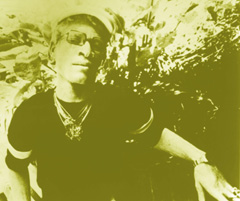It is hard to say which is more impressive: the reputation that precedes reggae/dancehall legend “King” Yellowman, or the unique circumstances that have shaped his life. Consider this: for more than 25 years, Yellowman has been Jamaica’s foremost ambassador of reggae music, second only to the late Bob Marley. He has sold out venues all over the word, from Madison Square Garden to Tokyo, Japan. Even reggae’s new-school leaders, like Beenie Man and Eek-A-Mouse, have publicly recognized him as the “King” of dancehall.
These accolades afford Yellowman top bragging rights, a liberty that he is not shy in taking. Amongst other things, it is his uncanny ability to brag that has made him such a legend. But there is more to Yellowman’s story than just his musical accomplishments. In fact, the story of his life speaks all for itself, and he isn’t shy about bragging about that either.
But first…
SAY HELLO TO YELLOWMAN
SHis real name is Winston Foster, and he was born in Kingston, Jamaica
SHe is the number one selling reggae artist next to Bob Marley
STwo words: Forty records! He released ten Best-Selling albums in Jamaica within a six-month period.
SHis Freedom of Speech album was nominated for 1997 Grammy Award’s Best Reggae Album.
SHe has collaborated with artists ranging from Gregory Isaacs to RUN DMC.
SHe has performed with the same crew, the Sagittarius Band, for 25 years.
SRecord company Real Authentic Sounds recognizes him as “the most requested DJ in dancehall history”. Some of his hits, such as “Nobody Move, Nobody Get Hurt” (Dr. Dre looped this and made a hit) and “Zungguzungguguzungguzeng” (believe it or not) have appeared on more than twenty different compilation albums combined.
When Mojo Magazine called Yellowman “reggae’s most unlikely superstar”, they were not kidding. Although Yellowman has stood out from a very early age, it was not initially because of his skills. Instead, it was his albinism, the condition that gives him light skin and yellowish hair, that first set him apart. In the ghettos of his hometown, like much of the island, Yellowman faced discrimination and ridicule. Jamaica’s way of treating his condition was to institutionalize him, sending him through a series of schools for children with special needs.
Instead of accepting the role of an outcast, young Foster adopted the role of braggart. Stepping into the early club scenes of Jamaica, Foster took the name Yellowman and began dee-jaying. Over “dub”, or raw beats, Yellowman’s commandeering voice and on-point rhyming/rapping/chanting, gave birth to a new style of performing, called “toasting”. Almost instantly, Yellowman had audiences laughing, blushing, and most importantly, dancing; when he wasn’t humorously bragging about his greatness, he was offering catchy innuendos (known as “slackness”) that oddly enough turned this once ousted individual into a national sex symbol.
As an established live musician, Yellowman began a prolific recording career. His albums were being played all over Jamaica and Europe, and he was starting to tour on a regular basis. For years, this success would keep Yellowman at the top of his game. Life, however, had different plans for this guy. In 1986, a simultaneous diagnosis of throat and skin cancer, accompanied by an estimation that he would die within six months, had Yellowman in a precarious position. It was only five years earlier that the world lost Bob Marley, whose rapid descent from cancer had millions stunned.
Fortunately, it was not in Yellowman’s character to give up easily. After major surgery, which left him with a disfigured face, Yellowman came back with a vengeance, embarking on his largest world tour ever. The cancer did have a significant impact on his music; though has not lost his humorous element, his newer songs have been appreciated for their maturity and consciousness, and also for their return to the “roots” of dancehall. “You know the vintage thing always come around back,” he has said, “What go around come around. It’s time to bring back positivness in the music because reggae is a peace and love and positive type of vibe.’
Finally, it is Yellowman’s live performances that have, and always will, secure him his crown. His innovations have set the pace for the younger reggae stars, and have laid the groundwork for their success, but no one has quite captured his style. Wildly energetic and entertaining, it seems as though absolutely nothing can stop this man from doing what he does best: moving the crowd.





















































